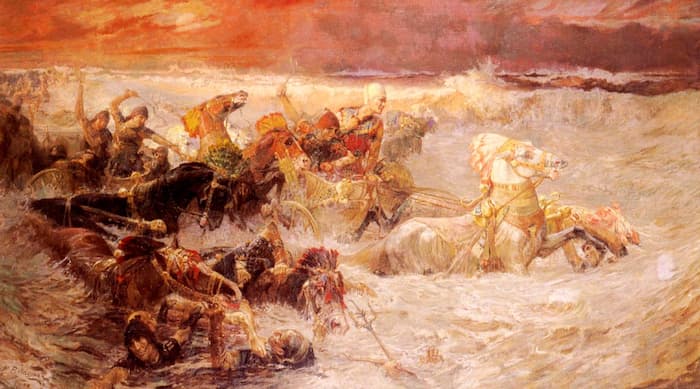The name of the parsha, “Beshalach,” found in Exodus 13:17, meaning “When he sent.”
Pharaoh quickly forces the children of Israel to return to Egypt after permitting them to leave, and the Israelites become caught between his army and the sea. When Moses raises his rod above the water as instructed by God, the sea separates to let the Israelites pass and then closes over the oncoming Egyptians. A song of thanks and adoration for God is sung by Moses and the Israelites.
The people in the desert are hungry and thirsty, and they frequently moan about it to Moses and Aaron. God magically transforms the salty waters of Marah into pleasant liquid, and later commands Moses to tap a rock to cause it to erupt with water. He makes quails appear in the Israelite camp every evening and makes manna fall from the sky before dawn every morning.
The children of Israel are told to gather twice as much manna on Friday because no manna will fall on Shabbat, the day of rest that has been set aside by divine law. On the seventh day, some go looking for manna in defiance and come up empty-handed. As a testament for future generations, Aaron saves a small amount of manna in a jar.
The Amalekites attack the inhabitants in Rephidim, but Moses’ prayers and an army assembled by Joshua drive them back.
Parashat Beshalach is made up of 6,423 Hebrew letters, 1,681 Hebrew words, 116 verses, and 216 lines in a Torah Scroll.
The Song of the Sea, which is typically chanted to a separate melody and is inscribed by the scribe using a distinct brick-like pattern in the Torah scroll, is a prominent portion of the parashah. As the Song of the Sea is frequently referred to as the Shirah, the Sabbath is known as Shabbat Shirah when it is read (song). Feeding birds and aloud recitation of the Song of the Sea during the normal worship session are two practices for this day that certain communities observe.
Deborah’s narrative is told in the haftara for Beshalach. It is the longest haftara, with 52 verses.



















One Response